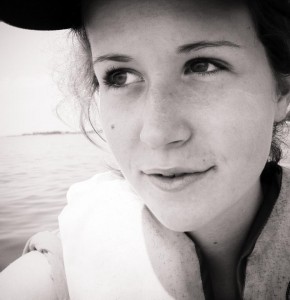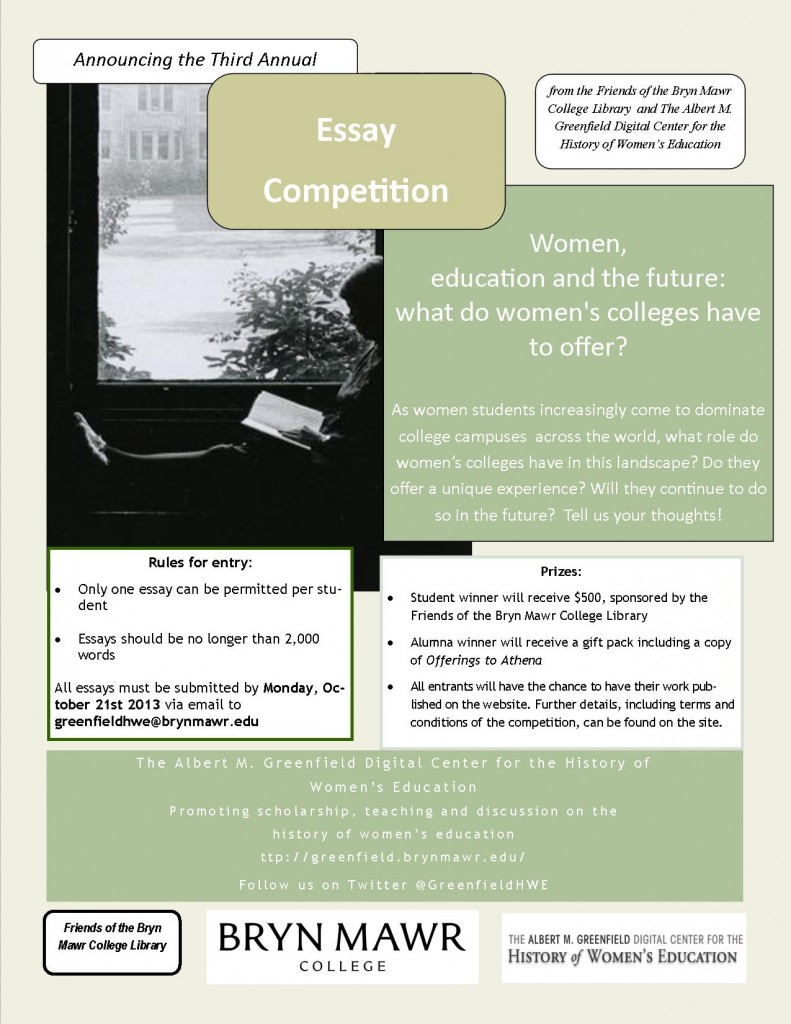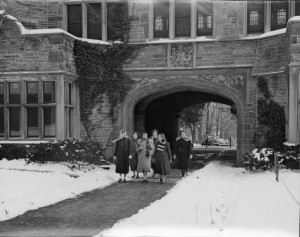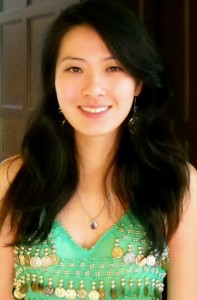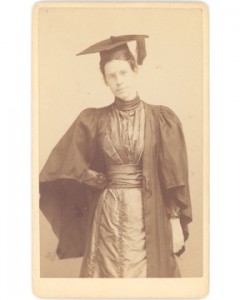“There is no greater inspirational force than that which comes from surrounding
oneself with individuals whom she admires.”
We are excited to announce the first of the two winners of the third annual essay competition of The Albert M. Greenfield Digital Center for the History of Women’s Education, sponsored by The Friends of the Bryn Mawr College Library. Our student winner, freshman Erica Rice, responded thoughtfully to the prompt “Women, education and the future… what do women’s colleges have to offer?” In her essay, she asserts that “equality means not only the freedom to be the same, but also very much the freedom to be different.” The benefits to be reaped from a women’s college education are not a uniform commodity, but are rather the extent to which the college culture and experience allow each individual to avidly pursue a chosen path and excel in the areas in which she is most passionate. Congratulations, Erica!…
Women’s Colleges:
Necessary and Invaluable
The college experience can very easily become a paradox, as a college education should be what equips a young person to accomplish whatever they wish, yet during the time spent earning a diploma, a great deal of pruning other dreams and aspirations is necessary to earn the title of college graduate. The ability to focus and make decisions about one’s future is indeed important, but all too often in the college setting, in the process of becoming a college graduate, pieces of the individual dissolve. Colleges and universities have plenty to offer the future, but people have more. At women’s colleges, the student body is made up of individuals willing to identify as different and who believe that it is their individual aspirations combined with a college diploma that will be what changes their world. The college experience for these women will be a tool, not an identity; because their identity is something they are not willing to compromise.
In addition to bringing together an impressive and self-selecting group of individuals, the experience of women’s colleges is a precious commodity that will become no less important in the future. That women have come to assert themselves as intellectual assets on college campuses across the world is wonderfully exciting and an absolutely necessary aspect of global progress in every way. Leveling the gender discrepancy in education continues to be a process that demands the support of groups and individuals in every sector. However, it is vital to remember that equality means not only the freedom to be the same, but also very much the freedom to be different. This is where the experience of women’s colleges is so important. Women’s colleges provide that opportunity to both learn and live as part of a community aware of both its uniqueness as well as its absolute viability in an academic setting without ever asking the individual to sacrifice her identity as she knows it.
This corner of the educational landscape is incredibly valuable and that it be preserved is necessary. As a member of such a community, I can speak personally to the value of the institution of a women’s college. By making the decision to be a part of a community which is so deliberately unique, I have placed myself among the ranks of women who are united in our common goal of wanting to be agents of change and progress in our worlds. There is no greater inspirational force than that which comes from surrounding oneself with individuals whom she admires. At women’s colleges, peers serve as motivators because passion is contagious and I have experienced no shortage in a women’s college community.
Women who make the choice to attend all women’s colleges do not do so with the intention of being ignored. We plunge into our identities as we see them with confidence and live in our community with purpose. At women’s colleges, the product is not simply a college graduate. Rather, women’s colleges produce something far more influential: educated women who have reached their respective goals in their own ways. Women of this kind are what shape the world and that they have every resource to cultivate their aspirations is crucial. The accomplishments of graduates of women’s colleges are too many to count, as will be the contributions of future women in these institutions. Some things, however, are certain: these institutions offer something to their students that is unique and precious, and the world waits with bated breath for what the individuals who make these colleges what they are will offer next.
…
Do you have thoughts about the place of the women’s college in the twenty-first century educational landscape? Have there been aspects of your experience that have shaped your understanding of education for women in the world today? Respond in the comments, or tweet us @GreenfieldHWE!
